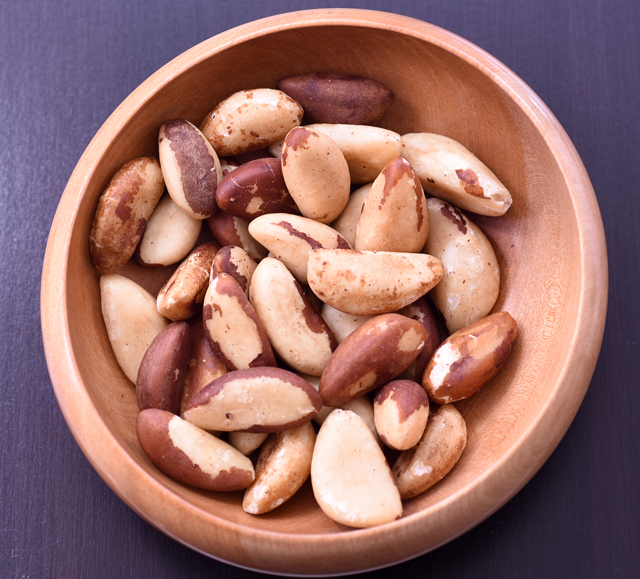The bush apple tree found to have neuroprotective properties that could be used as an intervention against neurodegenerative diseases
10/01/2019 / By Melissa Smith

A person’s brain health declines as he ages. In particular, neurons — building blocks of the nervous system — die or become damaged. As a result, his risk of developing neurodegenerative diseases such as Alzheimer’s and Parkinson’s disease increases. Fortunately, he can protect himself from neurodegenerative diseases with the help of natural medicines like the bush apple tree (Heinsia crinite), according to a study published in the journal Food Science and Human Wellness.
The leaves of the bush apple tree are consumed as a vegetable or as a component of concoctions for treating bacterial infections, diabetes, hypertension, and infertility. Their effect on neurodegenerative disease, however, is something that has not yet been fully understood.
In the study, researchers from the Federal University of Technology and the Federal Institute of Industrial Research Oshodi in Nigeria and the Federal University of Santa Maria in Brazil investigated the potential neuroprotective effect of the leaves of the bush apple tree. Aqueous and methanol extracts of the leaves were used to see their effects on oxidative stress in rat brains. Oxidative stress plays a role in the development of Alzheimer’s disease and Parkinson’s disease. They also determined the total phenol and flavonoid contents of the extracts.
The researchers discovered that the bush apple leaf contains high levels of phenolic compounds, such as quercetin, ellagic, chlorogenic, and caffeic acids. In addition, they found that the aqueous bush apple leaf extract had higher total phenol and flavonoid contents than the methanol extract.
The results of the experiment demonstrated that aqueous and methanol bush apple leaf extracts modulated the activities of enzymes linked to Alzheimer’s disease and Parkinson’s disease. The extracts also inhibited ferrous ion (Fe2+)-induced lipid peroxidation in isolated rat brain.
In addition, the extracts suppressed the production of malondialdehyde in rats’ brains. The aqueous extract, in particular, exhibited greater neuroprotective effects. Malondialdehyde is a toxic chemical that causes oxidative damage to brain cells. It also contributes to the development and progression of neurodegenerative conditions. Based on these results, the researchers concluded that bush apple leaves could be used in functional food. The leaves can also improve symptoms of neurodegenerative diseases like Alzheimer’s disease and Parkinson’s disease.
More ways to protect your brain from degeneration
Although aging is inevitable, preventing cognitive decline is possible. In addition to taking bush apple leaf extract, here are more things you can do to help preserve your brain function:
- Exercise your brain – Animal and human studies showed that doing brain activities stimulate new connections between nerve cells. These may even help the brain produce new cells. Reading, taking courses, and solving word puzzles or math problems can help build up your brain.
- Get moving – Physical activity also helps keep your brain sharp. In one study, researchers found that animals who exercise regularly experienced increases in small blood vessels that bring oxygen-rich blood the area of the brain responsible for thought. Exercise also accelerates the development of new nerve cells and improves the connections between brain cells. As a result, the brain becomes more efficient and adaptive, leading to better performance.
- Eat healthily – As you get older, your brain is exposed to more harmful stress, leading to oxidation that damages brain cells. Fortunately, with proper nutrition, you can reduce oxidative damage. One of the best diets for maintaining brain health is the Mediterranean diet. It encourages eating plenty of fruits, vegetables, fish, nuts, olive oil, and plant sources of protein – all of which help lower the risk of cognitive decline and dementia. (Related: Maintaining brain health: Keep your brain young with these supplements and lifestyle habits.)
- Improve your blood pressure, blood sugar, and cholesterol levels – Having one of these health conditions increases your risk of cognitive decline. You can prevent these by following a healthy and balanced diet and exercising regularly.
- Socialize – Leading an active social life can help prevent memory loss. Engage in stimulating conversation and stay connected with your family and friends.
- Get enough sleep and relax – Getting enough sleep and managing your stress help reduce the buildup of beta-amyloid plaque in the brain, which is associated with Alzheimer’s disease.
For more strategies on keeping your brain young and sharp, visit BrainHealthBoost.com.
Sources include:
Tagged Under: alternative medicine, Alzheimer's disease, Brain, brain function, brain health, brain nutrients, bush apple, bush apple leaves, cognitive function, disease treatments, flavonoids, food cures, food is medicine, food science, functional food, Heinsia crinite, herbal medicine, Herbs, malondialdehyde, natural cures, natural medicine, neurodegeneration, neurodegenerative disease, neuroprotective, oxidative stress, Parkinson's Disease, Phenolic acids, phytonutrients, polyphenols, prevention, remedies, research
RECENT NEWS & ARTICLES
BrainFunction.News is a fact-based public education website published by Brain Function News Features, LLC.
All content copyright © 2018 by Brain Function News Features, LLC.
Contact Us with Tips or Corrections
All trademarks, registered trademarks and servicemarks mentioned on this site are the property of their respective owners.


















